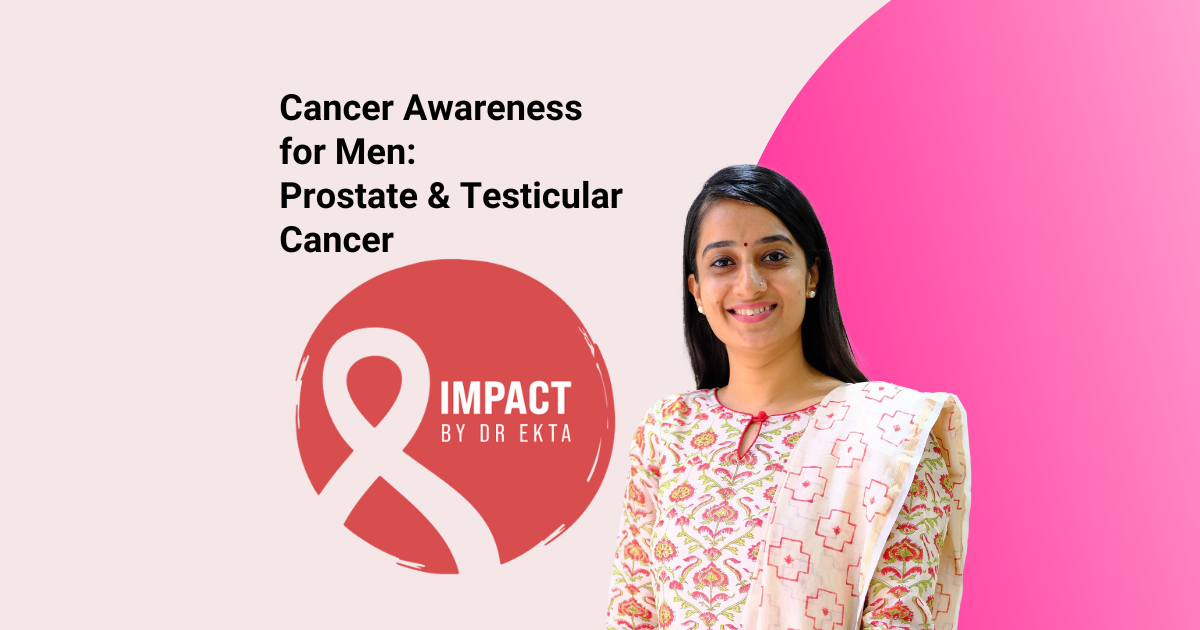I have had the privilege of working with patients who teach me invaluable lessons about life and resilience. One of the most important lessons I have learned is the power of awareness. Today, I want to talk about a topic that often gets overshadowed but is critical for men: cancer awareness, particularly regarding prostate and testicular cancer. These two types of cancer affect thousands of men every year, yet they remain surrounded by stigma, silence, and misinformation. My goal is to provide insight and foster cancer awareness, empowering men to take charge of their health.
Prostate Cancer: What Every Man Should Know
Prostate cancer is one of the most common cancers among men, especially those over the age of 50. The prostate is a small gland located below the bladder and in front of the rectum. Its primary function is to produce seminal fluid, but like any organ, it is susceptible to cancer.
Risk Factors
While the exact causes of prostate cancer are not fully understood, several risk factors have been identified:
- Age: The risk increases significantly after the age of 50.
- Family History: Men with a father or brother who had prostate cancer are at higher risk.
- Ethnicity: African-American men are more likely to develop prostate cancer than men of other ethnicities.
- Lifestyle Factors: A diet high in red meat and fat, combined with low consumption of fruits and vegetables, can increase risk.
Symptoms and Early Detection
Early stages of prostate cancer often have no symptoms. As the cancer progresses, men may experience:
- Frequent urination, especially at night
- Difficulty starting or stopping urination
- Weak or interrupted urine flow
- Painful urination or ejaculation
Early detection is key. A simple blood test called the prostate-specific antigen (PSA) test can help identify potential issues. While a high PSA level does not always indicate cancer, it is a signal to investigate further.
Cancer awareness plays a critical role here. I always encourage my patients to have open conversations with their doctors about routine screenings, particularly if they fall into high-risk categories. Early diagnosis often means a wider range of treatment options and better outcomes.
Testicular Cancer: A Young Man’s Concern
Unlike prostate cancer, which typically affects older men, testicular cancer is more common in younger men, especially between the ages of 15 and 35. Although it is less common than prostate cancer, testicular cancer is highly treatable when caught early.
Risk Factors
While the exact cause remains unclear, the following factors can increase the likelihood of testicular cancer:
- Undescended Testicle (Cryptorchidism): Men born with a testicle that did not descend into the scrotum are at higher risk.
- Family History: A close relative with testicular cancer increases risk.
- Previous Testicular Cancer: Having cancer in one testicle increases the risk of developing it in the other.
Symptoms and Self-Exams
Cancer awareness for testicular cancer starts with understanding the symptoms, which may include:
- A lump or swelling in one testicle
- A feeling of heaviness in the scrotum
- Pain or discomfort in the testicle or scrotum
I emphasize the importance of regular self-examinations. These take only a few minutes and can be done in the shower when the scrotal skin is relaxed. Feel for any unusual lumps, changes in size, or irregularities. If something feels off, consult a doctor immediately. Early detection is often life-saving.
The Role of Cancer Awareness
Why is cancer awareness so vital for men? Because knowledge can mean the difference between catching cancer early and fighting it at a more advanced stage. Unfortunately, societal norms often discourage men from discussing their health concerns openly. This silence can lead to delays in seeking medical attention.
Breaking the Stigma
One of the most significant barriers to cancer awareness is stigma. Men may feel embarrassed to discuss issues related to their prostate or testicles. As an oncologist, I strive to create a safe and supportive environment where my patients can speak freely. Breaking down these barriers is a collective effort that requires open conversations, education, and support from families and communities.
Encouraging Routine Screenings
Routine screenings save lives. For prostate cancer, this may involve regular PSA tests or digital rectal exams (DRE). For testicular cancer, self-examinations are crucial. Cancer awareness campaigns that highlight the importance of these practices can significantly improve early detection rates.
Living Beyond Cancer
For those diagnosed with prostate or testicular cancer, life doesn’t end with a diagnosis. Treatment options have advanced significantly, offering hope and better outcomes. From surgery to radiation therapy, hormonal therapy, and chemotherapy, treatments are tailored to individual needs.
Survivorship is another critical aspect of cancer awareness. Many men face physical, emotional, and psychological challenges after treatment. Support groups, counseling, and rehabilitation programs can help them navigate this new chapter. I often remind my patients that asking for help is a sign of strength, not weakness.
Steps to Reduce Cancer Risk
While not all cancers are preventable, certain lifestyle choices can lower your cancer risk:
- Healthy Diet: Focus on a balanced diet rich in fruits, vegetables, whole grains, and lean proteins. Limit red meat and processed foods.
- Regular Exercise: Aim for at least 150 minutes of moderate exercise per week.
- Avoid Tobacco and Limit Alcohol: Smoking and excessive alcohol consumption increase cancer risk.
- Maintain a Healthy Weight: Obesity is linked to higher cancer risk, including prostate cancer.
- Manage Stress: Chronic stress can weaken the immune system. Practices like meditation, yoga, or simply connecting with loved ones can help.
Spreading the Message
Cancer awareness is a collective responsibility. Men need to understand that seeking help early is not a sign of weakness but an act of courage and self-care. Friends, families, and healthcare professionals must foster an environment that encourages open discussions about health.
I also encourage participation in cancer awareness campaigns. Whether it’s wearing a ribbon, sharing information on social media, or organizing community events, every effort counts. Awareness leads to early detection, and early detection saves lives.

